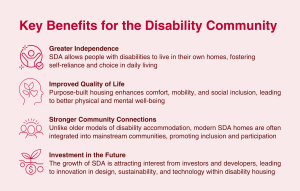The Rapid Growth of Specialist Disability Accommodation: A Game-Changer for the Disability Community
The Specialist Disability Accommodation (SDA) sector is experiencing significant growth, transforming the housing landscape for Australians with high support needs. As part of the National Disability Insurance Scheme (NDIS), SDA is designed to provide purpose-built, accessible housing that promotes independence, dignity, and community inclusion for people with disabilities.
A Growing Sector with a Big Impact
Over the past few years, the SDA market has expanded rapidly, driven by increased investment, evolving design standards, and a growing recognition of the need for high-quality, accessible housing. According to recent industry data, the number of SDA-approved dwellings continues to rise, offering more choices to NDIS participants who require specialised housing solutions.
This growth is not just about numbers—it’s about improving lives. SDA properties are designed with accessibility in mind, incorporating features like wider doorways, step-free access, assistive technology, and enhanced safety measures. These homes enable residents to live more independently while receiving the support they need, reducing reliance on traditional environments.
Challenges and Opportunities Ahead
While the sector’s growth is promising, challenges still remain. Demand for high-quality SDA housing still outpaces supply in some areas, and navigating the approval and funding process can be complex for participants. Additionally, ensuring that SDA properties remain person-centred—rather than purely investment-driven—is critical to maintaining quality outcomes for residents.
Moving forward, continued collaboration between government, industry, and the disability community will be essential to sustaining this momentum and ensuring that SDA delivers on its promise of providing secure, accessible, and empowering housing solutions.
The ongoing expansion of the SDA sector marks a significant step toward a more inclusive society. By prioritising choice, independence, and quality living environments, SDA is not just reshaping disability housing – it’s reshaping lives.
As a specialist recruiter in the SDA space, I thrive on working with candidates whose sole focus is to drive change in this emerging space. If you’re a client who needs support finding the right talent or a candidate looking for your next role – please contact me via alex@johnsonrecruitment.com.au or call 0472 510 848.
READ MORE
